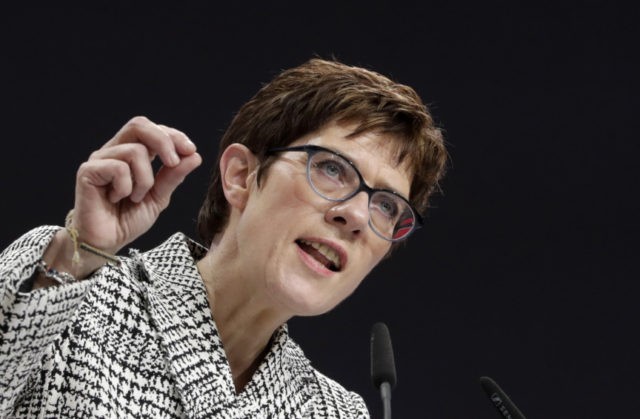HAMBURG, Germany (AP) — German conservatives on Friday elected an ally of Chancellor Angela Merkel to become her party’s new leader — giving her the challenge of opening a new chapter and improving the party’s electoral fortunes after 18 years under Merkel.
Annegret Kramp-Karrenbauer, 56, narrowly defeated one-time Merkel rival Friedrich Merz at a congress of the center-right Christian Democratic Union. The result points to policy continuity, and Kramp-Karrenbauer should be able to work well with Merkel as she serves out her term as chancellor.
Kramp-Karrenbauer won a runoff vote by 517 votes to Merz’s 482 after a third candidate, Health Minister Jens Spahn, was eliminated in a first round of voting.
Kramp-Karrenbauer, previously the CDU’s general secretary, embraced Merkel and was quick to call for unity after the vote, saying “there is a place in this party” for her defeated leadership rivals.
Merkel announced in October she would give up the party’s reins but plans to remain chancellor until her current term ends in 2021. However, it’s possible that Germany’s next general election could come earlier.
Kramp-Karrenbauer — often known as “AKK” — will be the favorite to run for chancellor in the next election, though that isn’t automatic. She becomes only the eighth leader of the CDU since World War II. All but two of her predecessors served as chancellor.
She was the closest of the three candidates to Merkel’s centrist stance, though she is no Merkel clone and has consistently shown a greater willingness to cater to conservative rhetoric.
In recent weeks, the new party leader sought to put a careful distance between herself and Merkel without disavowing her, saying she has had “very lively discussions” with the chancellor on various subjects.
She has talked tough on immigration issues, proposing a lifelong entry ban to Europe for asylum-seekers convicted of serious crimes. But she has warned that endlessly rehashing debates about Merkel’s decision to allow in large numbers of migrants in 2015 is a turn-off for voters.
Kramp-Karrenbauer’s pitch centered on her own lengthy experience in regional government, which saw her become the first woman to become a German state’s interior minister, or top security official, and serve as governor of western Saarland state. She gave up that job in February to become the CDU general secretary, in charge of day-to-day strategy.
Kramp-Karrenbauer says she knows how to win elections, having defied expectations to win re-election in Saarland by a wide margin last year.
Merkel has been CDU leader since 2000 and chancellor since 2005. She has moved her party relentlessly to the center, dropping military conscription, accelerating Germany’s exit from nuclear energy and introducing benefits encouraging fathers to look after their young children. She also allowed the introduction of gay marriage, which Kramp-Karrenbauer was more vehement in opposing.
In a farewell speech as leader, Merkel said Friday that “our CDU today is different from the year 2000, and that is a good thing.”
She also celebrated Germany’s balancing its budget in recent years and its response to the eurozone debt crisis.
For years, Merkel’s popularity lifted the CDU and its Bavaria-only sister party, the Christian Social Union. In the 2013 election, they won 41.5 percent of the vote and only just fell short of an outright parliamentary majority.
At present, the center-right bloc is polling around or below 30 percent. Merkel’s fourth-term governing coalition with the center-left Social Democrats has lurched through a series of crises since taking office in March, and the CDU has lost supporters both to the liberal Greens and the far-right Alternative for Germany.
Merkel, however, recalled that the CDU was in a deep crisis when she took over in 2000, mired in a party financing scandal surrounding ex-Chancellor Helmut Kohl.
“We are in demanding times today, no doubt about that,” she said. “But … we faced an hour of destiny for the Christian Democratic Union 18 years ago.”
“We kept a cool head,” she said. “We showed everyone.”
“I wasn’t born as chancellor or as party leader,” she said. “I have always wanted to do my government and party jobs with dignity, and one day to leave them with dignity … now it is time to open a new chapter.”
Merkel was greeted by a long standing ovation, with some delegates holding up “Thank you, boss” placards.
___
Moulson reported from Berlin

COMMENTS
Please let us know if you're having issues with commenting.